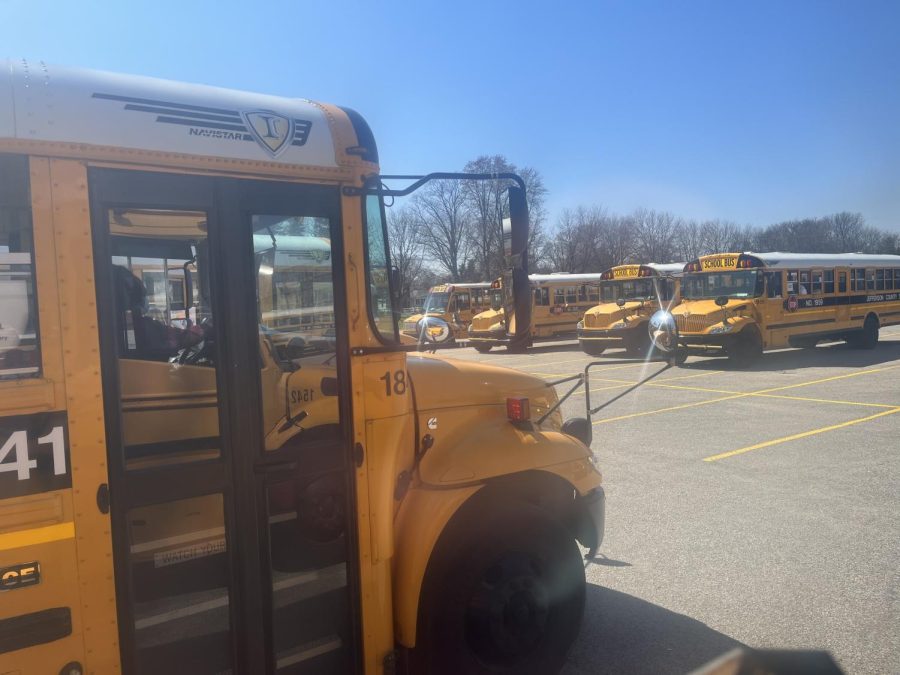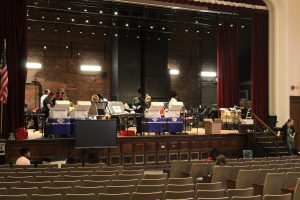Dynamic Ideas: The Textbook Company Behind the Start Smart Initiative
Some Manual students will once again receive bus transportation beginning March 17, 2025.
April 17, 2023
JCPS approved their proposal for a new bell schedule, the Start Smart Initiative, on March 28. This change includes nine start times, ranging from 7:40 to 10:40, as opposed to the previous two, 7:40 and 9:05. It will go into effect for the 2023-24 school year.
The district considered two primary factors in the creation of the proposal, the health of students and logistical issues with busing. The former has received the majority of the publicity on the proposal’s website.
“We contracted with Dynamic Ideas, which is a third party vendor that uses routing software and algorithms developed out of MIT research. Dynamic Ideas has studied our bell times and transportation routes in order to provide a plan, which is the Start Smart proposal,” Amanda Herzog, Assistant General Counsel of Contracts, Insurance and Data Sharing for JCPS, said.
Dynamic Ideas is a textbook company whose “authors are leading professionals in their respective fields.”
During the Superintendent’s Report for the Jefferson County Board of Education (JCBE) meeting on February 28, Dr. Marty Pollio discussed what he called “the most compelling, the most irrefutable data and research that I’ve brought to you at any point in time during my superintendency.”
This data and research touched on JCPS attendance but focused primarily on student health and safety. Pollio cited studies including those from American Academy of Pediatrics, Science Advances and the National Institute of Health.
All of the studies were credible, published in peer-reviewed journals and discussed the health of students, but Science Advances holds the most relevance for the Start Smart Initiative, as it was based on Seattle Public Schools’s start times. The study saw an increase in median sleep by 34 minutes, a 4.5% increase in grades and a decrease in adolescent-involved car crashes.
The Seattle Public Schools (SPS) attempted, somewhat successfully, to change their start times after the study’s findings. They adjusted the bell schedule so that all of its high schools, with the exception of two schools that serve students with diverse learning needs, started at 8:50 A.M.
The pushed back start times proved to be beneficial for adolescents in Seattle. However, there is a distinct difference between their plan and JCPS’s plan. In SPS, all high schools were pushed back to later start times. In JCPS, six high schools will continue to start at 7:40 A.M. With this difference in the number of high schoolers who would have later start times, it is difficult to compare the possible benefits of JCPS’s plan and the benefits found in Science Advance’s study of SPS.
Despite his work in presenting “irrefutable data and research,” Pollio did not create the bell schedule on his own. During the February 28 JCBE meeting, Chris Perkins, the Chief Operations Officer for JCPS, mentioned Dynamic Ideas, the textbook company that formed the plan, when discussing the logistical side of the Start Smart Proposal.
One of the authors and co-founders for Dynamic Ideas is Dimitris Bertsimas, who works with the Massachusetts Institute of Technology and is a co-founder of six different analytics companies, one of which is AlphaRoute.
AlphaRoute is the company that JCPS contracted to create the schedule, designed to allow “transportation systems to increase efficiencies and provide safe and reliable rider experiences.”
Representatives for JCPS and Dynamic Ideas LLC/dba AlphaRoute, a limited liability company, signed a contract in which JCPS would be provided with “optimized school bell times based on relevant district objectives and conditions,” for $180,000 compensation.
AlphaRoute has also worked with other school districts to fix transportation issues, including the Columbus City School District (CCS). CCS paid $1,569,388 for AlphaRoute services for a three year contract, which was implemented at the beginning of the 2022-23 school year.
However, on Nov. 14 of last year, CCS announced that they would change their busing routes and stops starting Jan. 3, 2023. After using AlphaRoute for approximately four months, they transitioned back to their previous system, VeraTrans.
“Our primary challenge was the national shortage of bus drivers, which forced us to put more students on fewer buses. While AlphaRoute helped us create routes, we didn’t have enough drivers to cover all of the routes, and we didn’t know enough about the system to be able to make changes or updates on the fly,” Jaqueline Bryant from the CCS Transportation Department said.
While AlphaRoute was only utilized by JCPS to “optimize school times based on relevant district objectives,” according to the contract signed by both parties, CCS used their software for routing as well.
“It’s important to note that each school system’s needs will be different, and their experience with AlphaRoute may differ from ours,” Bryant said.









